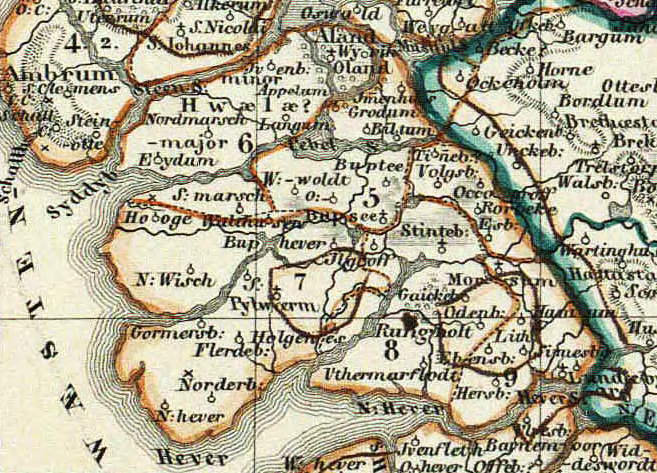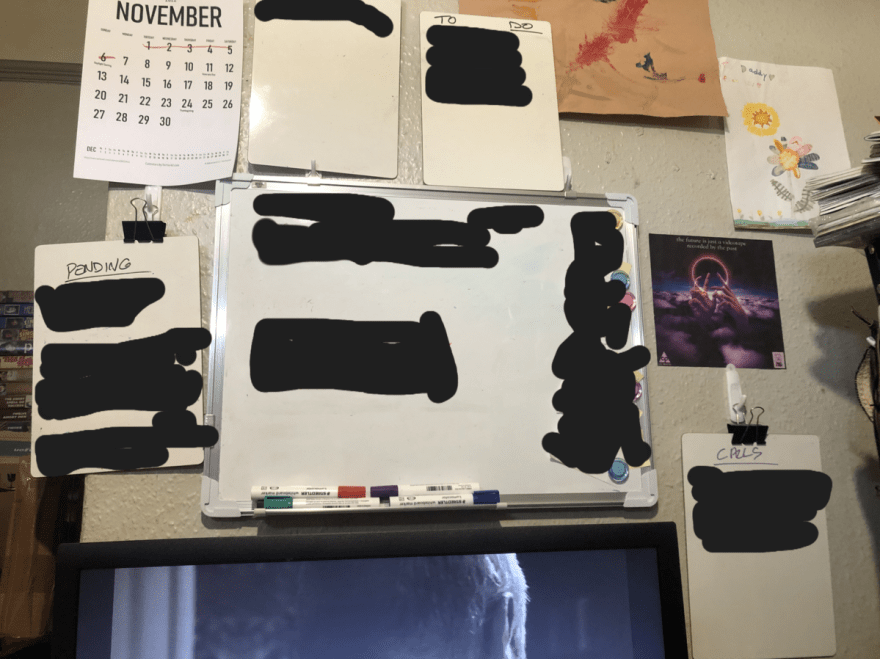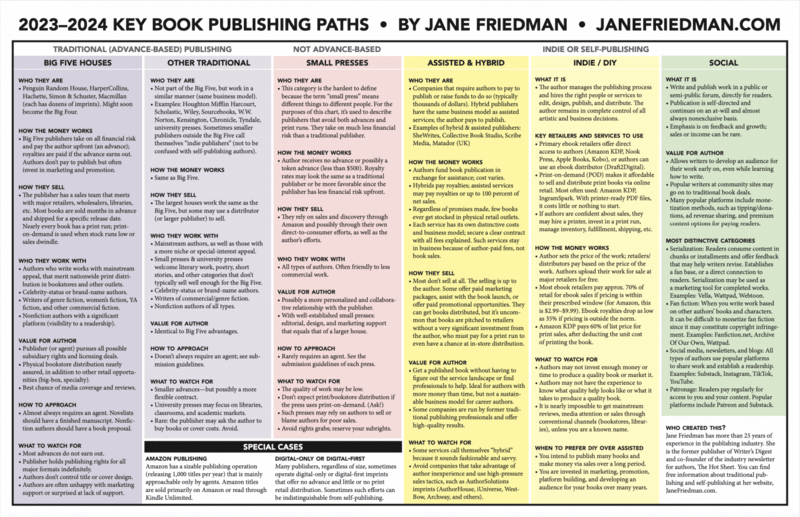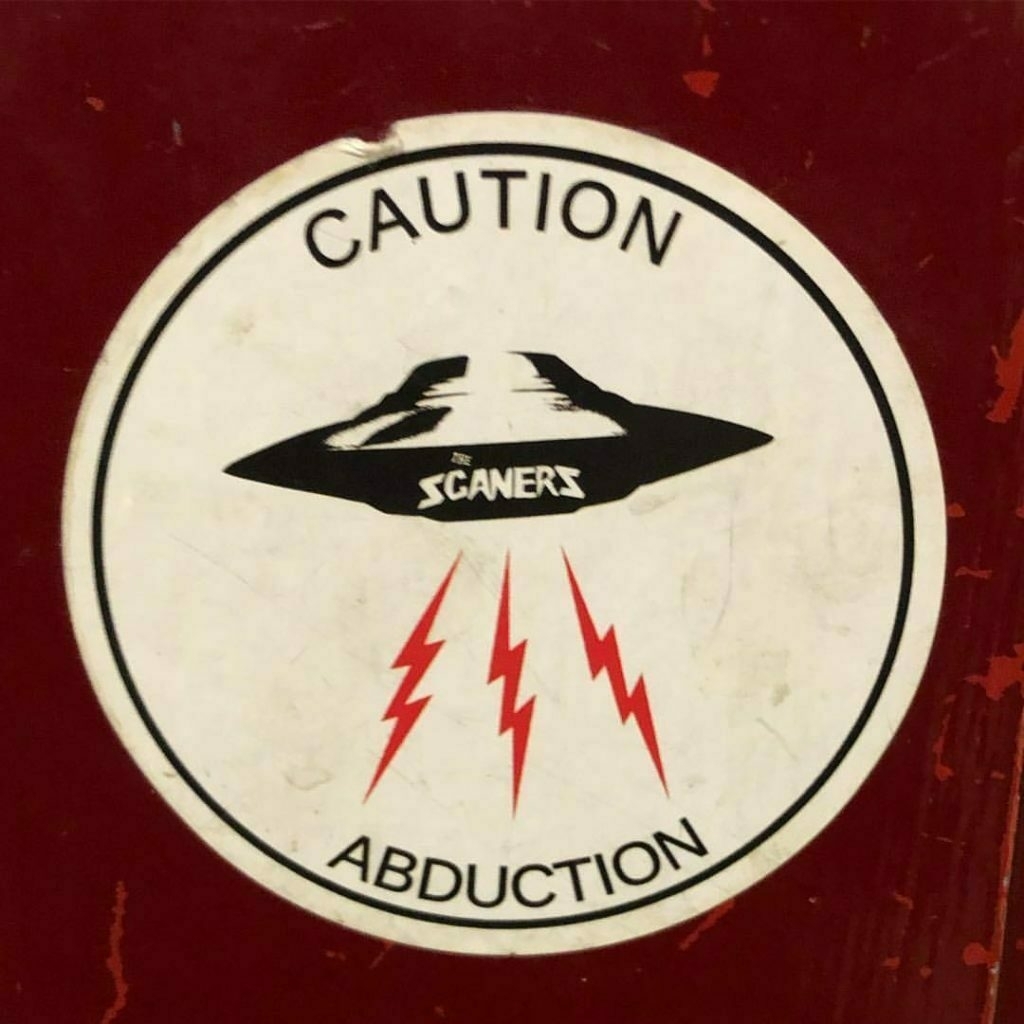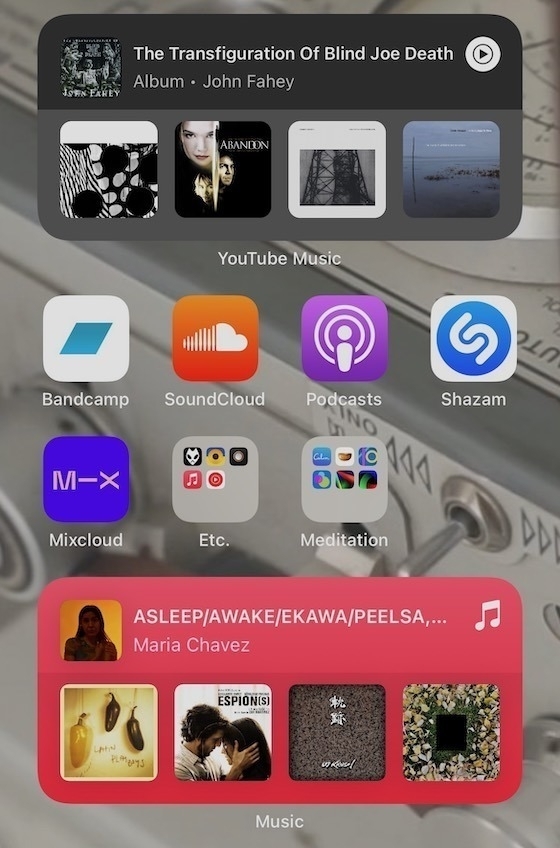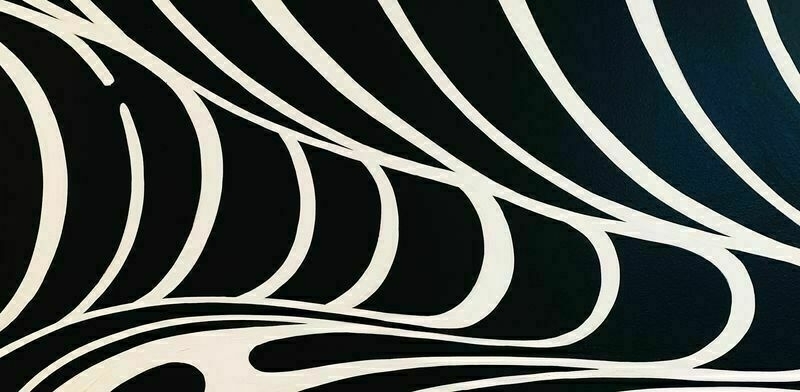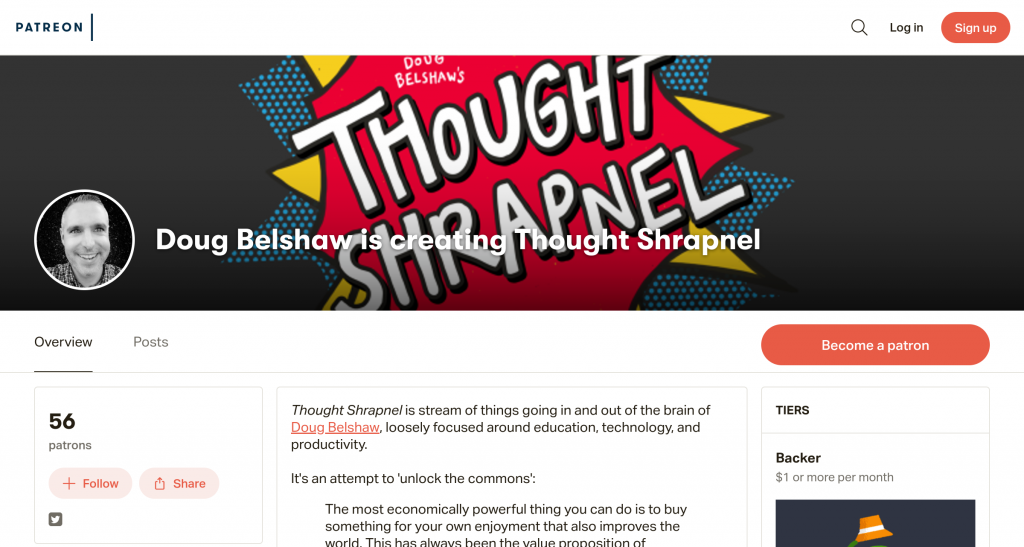- There are now many varieties of traditional publishing and self-publishing, with evolving models and diverse contracts.
- It’s not an either/or proposition; you can do both. Many successful authors, including myself, decide which path is best based on our goals and career level.
- Study shows some political beliefs are just historical accidents (Ars Technica) — "Obviously, these experiments aren’t exactly like the real world, where political leaders can try to steer their parties. Still, it’s another way to show that some political beliefs aren’t inviolable principles—some are likely just the result of a historical accident reinforced by a potent form of tribal peer pressure. And in the early days of an issue, people are particularly susceptible to tribal cues as they form an opinion."
- Please, My Digital Archive. It’s Very Sick. (Lapham's Quarterly) — "An archivist’s dream is immaculate preservation, documentation, accessibility, the chance for our shared history to speak to us once more in the present. But if the preservation of digital documents remains an unsolvable puzzle, ornery in ways that print materials often aren’t, what good will our archiving do should it become impossible to inhabit the world we attempt to preserve?"
- So You’re 35 and All Your Friends Have Already Shed Their Human Skins (McSweeney's) — "It’s a myth that once you hit 40 you can’t slowly and agonizingly mutate from a human being into a hideous, infernal arachnid whose gluttonous shrieks are hymns to the mad vampire-goddess Maggorthulax. You have time. There’s no biological clock ticking. The parasitic worms inside you exist outside of our space-time continuum."
- Investing in Your Ordinary Powers (Breaking Smart) — "The industrial world is set up to both encourage and coerce you to discover, as early as possible, what makes you special, double down on it, and build a distinguishable identity around it. Your specialness-based identity is in some ways your Industrial True Name. It is how the world picks you out from the crowd."
- Browser Fingerprinting: An Introduction and the Challenges Ahead (The Tor Project) — "This technique is so rooted in mechanisms that exist since the beginning of the web that it is very complex to get rid of it. It is one thing to remove differences between users as much as possible. It is a completely different one to remove device-specific information altogether."
- What is a Blockchain Phone? The HTC Exodus explained (giffgaff) — "HTC believes that in the future, your phone could hold your passport, driving license, wallet, and other important documents. It will only be unlockable by you which makes it more secure than paper documents."
- Debate rages in Austria over enshrining use of cash in the constitution (EURACTIV) — "Academic and author Erich Kirchler, a specialist in economic psychology, says in Austria and Germany, citizens are aware of the dangers of an overmighty state from their World War II experience."
- Cory Doctorow: DRM Broke Its Promise (Locus magazine) — "We gave up on owning things – property now being the exclusive purview of transhuman immortal colony organisms called corporations – and we were promised flexibility and bargains. We got price-gouging and brittleness."
- Five Books That Changed Me In One Summer (Warren Ellis) — "I must have been around 14. Rayleigh Library and the Oxfam shop a few doors down the high street from it, which someone was clearly using to pay things forward and warp younger minds."
Sitting staring at a wall for hours
Some wise words from author Warren Ellis, whose Sunday newsletter ‘Orbital Operations’ is well worth subscribing to.
Related: although she hasn’t specifically confirmed it, I get the feeling that Laura is working on a sequel to her novel Maybe Zombies. If you haven’t read it, I’d recommend it.
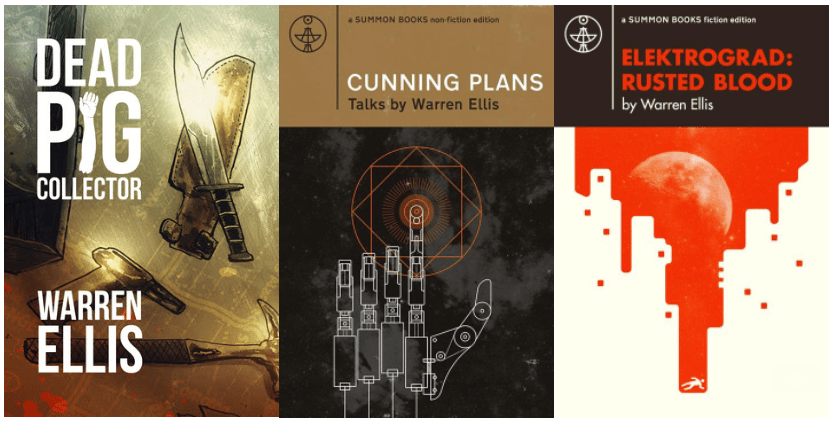
I remember a piece by Harry Harrison - maybe in HELL’S CARTOGRAPHERS - where he had to explain to his mother in law that when he was sitting staring at a wall for hours, he was in fact working. I imagine most writers will tell you three things about thinking time - it’s the most valuable work, the most frustrating work, and the least billable. Very few people in this world get paid for the hours spent staring at the wall. And it’s always frustrating, because what you want is for the form of a story to just drop into your head after thirty minutes in the chair, and that very rarely happens. It’s days or weeks of wandering around inside your own head and its stores, which looks to the rest of the world like you’ve become a vegetable creature whose circumnutations do nothing but slowly capture and engulf pieces of chocolate.Source: Orbital Operations, 5 November 2023Yes, we are all outwardly lazy bastards — and if you are entering the journey of a creator of stories now, then be advised — you’re allowed to stare at the wall for as long as you damn well like and need to. Those days and weeks of farting around within the walls of your mind are what every piece of art people love come from. Every story you ever adored? Someone sat around like a piece of meat propped on a sofa until it happened. There are no lazy writers. It just takes some of us longer to get off the sofa and put the pen “on the attack against the innocent paper.”
(That line is from Olga Tokarczuk.)
You have permission to dream other lives and whole new worlds for as long as it takes.
Different levels of reading (technologies)
This post by author Nick Harkaway was shared by Warren Ellis in his most recent newsletter. It’s something that my wife and I have talked about recently, as she tends to print everything out to read.
I do occasionally, but only for things I want to read really closely. In fact, I’ve got three levels: deep (paper), medium (e-ink), and shallow (screen). Most of the work that I do doesn’t require super-close reading of the text but rather the general gist of what’s going on. I’ve got an A4-sized ereader so it’s easy to put stuff on there.
Previously, I have printed out things. For example, I printed out my doctoral thesis and put it on the windows of the Jisc offices to make tiny corrections when I was almost ready for submission. I think this is entirely OK and normal.
What I really want is a laptop screen where I can switch between a regular screen and e-ink. Something like this.
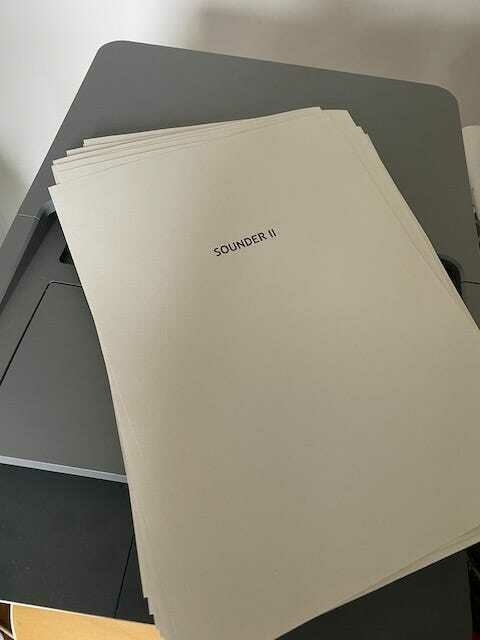
There’s a sense of reality in printing (and reading on paper) a finished novel. In theory, you can go through an entire creative effort without ever producing paper on your desktop, but for me there’s a separate space of “tangible book” which has a particular moment and a set of uses. This morning I printed the first two chapters to look at, and aside from the sense of pleasure in seeing a physical manifestation of work done (in this instance a sort of echo, because I held the whole book in A4 recycled a while ago) there’s a difference between words on screen and words on paper.Source: The Print | FragmentaryHolding paper, I notice different things. The work feels different - different tonal issues arise, new sections I need to rewrite. It’s akin to - but different again from - reading a book aloud and hearing the cadences, the unintentional repetitions and homonyms, the blunt force wrongness of an unmodified word. The text is not different, but the experience is, and of course it’s still the paper experience of my book that most people will have. (I think - a couple of my books were bigger sellers as ebooks than paper in some markets, but as far as I know, perhaps even moreso now than a few years ago, paper remains on the throne.)
There are actual science reasons why analogue reading is different - and as the writing process at this point is founded on reading and re-reading, those aspects must be interwoven with the creative edit, irrespective of whether the creative process of itself works differently in the brain depending on the medium in which it is iterated. Whether it’s an inherent quality in the combination of tactile experience and inert text, or whether it’s contingent on my knowledge that digital text is both infinitely editable and subject to sudden interruption when my desktop decides to notify me of something, I find there’s a placidity and a sense of authenticity in the work. I’m always wary of mystifying the tree’s presence in the printed book or the long inheritance of paper, but - be it a societal form or something more fundamental - paper feels more “in the world”.
The Atlantis of the North Sea
A couple of years ago, I started subscribing to Northern Earth magazine on the recommendation of Warren Ellis. It’s quirky and brilliant.
The most recent issue contains reference to Rungholt, which I then looked up on Wikipedia. It was destroyed in the 14th century due to a storm surge. Until excavations this year people weren’t entirely sure it ever existed but it turns out it was a flourishing port town.
Rungholt was a settlement in North Frisia, in what was then the Danish Duchy of Schleswig. The area today lies in Germany. Rungholt reportedly sank beneath the waves of the North Sea when a storm tide (known as Grote Mandrenke or Den Store Manddrukning) hit the coast on 15 or 16 January 1362.Source: Rungholt | Wikipedia[…]
In June 2023, the German Research Foundation announced that researchers had found the probable location of Rungholt under mudflats in the Wadden Sea and had already mapped 10 square kilometers of the area.
[…]
Today it is widely accepted that Rungholt existed and was not just a local legend. Documents support this, although they mostly date from much later times (16th century). Archaeologists think Rungholt was an important town and port. It might have contained up to 500 houses, with about 3,000 people. Findings indicate trade in agricultural products and possibly amber. Supposed relics of the town have been found in the Wadden Sea, but shifting sediments make it hard to preserve them.
Sixteen hours on, eight hours off.
I do like posts about people’s routines and, in fact, I contributed to a website which became a book of them! This particular one is by Warren Ellis, who seems to live quite a solitary existence, at least when he’s writing.
Being alone can bring an intensity to one’s work, I’ve found, which may or may not be relevant or welcome given on what you do for a living. Given Ellis is a writer of graphic novels, novellas, and screenplays, it’s absolutely fitting, I guess.
I work until I get hungry. I’ll watch something – a tv episode, part of a film – while eating lunch, which is either cold meats and flatbreads or salmon with vegetables or something with eggs. I keep it simple and repeatable. Also I have constant access to eggs, as mentioned above. At some point in the afternoon I’ll have an apple with walnuts and cheese. Eight espressos a day, two litres of water. I mention the food because the one thing productivity notes tend to forget is that thinking burns calories, and the first things to kill thinking are thirst and having no calories available to burn.Source: Morning Routine And Work Day, January 2022 | Warren Ellis
Getting your book published in 2023
This, via Warren Ellis, is a useful resource. I also like that its creator, Jane Friedman, has made it available to be downloaded, printed, and shared “no permission required” (although I wish she’d explicitly used a CC0 license)
When I shared this with a friend, they pointed out that it doesn’t include the ‘kickstarter’ kind of model. While Friedman points out that the chart is primarily for ‘trade press’ (i.e. books with a general audience) there’s a whole different type of approach, which I kind of pioneered a decade ago with OpenBeta and which is more easily achieved these days with platforms such as Leanpub.
(click on image to download PDF)
One of the biggest questions I hear from authors today: Should I traditionally publish or self-publish?Source: The Key Book Publishing Paths: 2023–2024This is an increasingly complicated question to answer because:
Thus, there is no one path or service that’s right for everyone all the time; you should take time to understand the landscape and make a decision based on long-term career goals, as well as the unique qualities of your work. Your choice should also be guided by your own personality (are you an entrepreneurial sort?) and experience as an author (do you have the slightest idea what you’re doing?).
The corrosive nature of captalism
I used to think there was no chance of the current system of capital-based society ending within my lifetime.
But now? I’m not so sure. I see influential writers I respect like Seth Godin and (in this case) Warren Ellis talk openly about the harms of capitalism.
And given the crypto collapse following the pandemic perhaps people are slowly coming to realise there’s more to life than money…
From a certain perspective, capitalism is the environment into which we are born, and conditions within it are corrosive: we either adapt to those conditions in order to survive — people will always have to be taught how to tend the machines, and it has been said, after all, that humans are the reproductive organs of machines — or build a sturdy environment suit, or we are seriously harmed. Which casts many of us as good little prisoners or effective wasteland scavengers.Source: A Suit Of Capitalism | WARREN ELLIS LTD
Image: Jorge Salvador
Developing your own style (and archive)
I like the way that Warren Ellis works out loud. I’ve read some great books because of this, and learned a lot about developing your own style.
I no longer look at traffic stats. I know what it is. That’s not what this site is for. This is a space for achieving personal goals: I’m using it to get thoughts out in front of me where I can see them properly, and if you’re here with me reading over my shoulder, I’m happy with that.Source: LTD Development | WARREN ELLIS LTD[…]
[T]his place should be a repository of all the things that interest me and teach me, under the general rubric of storytelling, culture and knowledge work. That’s the focus. This is a tool. That means, among other things, that I need to get better at deep linking back into the archive of the site. This is one thing that social media trained us out of. If you’ve been around a while, tumblelogs kind of did that to us too.
[…]
Modifier: “evolving the tools” becomes its own rabbit hole. Just learn the habit of putting stuff where you can fucking find it later, Warren.
Dedicated portable digital media players and central listening devices
I listen to music. A lot. In fact, I’m listening while I write this (Busker Flow by Kofi Stone). This absolutely rinses my phone battery unless it’s plugged in, or if I’m playing via one of the smart speakers in every room of our house.
I’ve considered buying a dedicated digital media player, specifically one of the Sony Walkman series. But even the reasonably-priced ones are almost the cost of a smartphone and, well, I carry my phone everywhere.
It’s interesting, therefore, to see Warren Ellis' newsletter shoutout being responded to by Marc Weidenbaum. It seems they both have dedicated ‘music’ screens on their smartphones. Personally, I use an Android launcher that makes that impracticle. Also, I tend to switch between only four apps: Spotify (I’ve been a paid subscriber for 13 years now), Auxio (for MP3s), BBC Sounds (for radio/podcasts), and AntennaPod (for other podcasts). I don’t use ‘widgets’ other than the player in the notifications bar, if that counts.
Warren Ellis' work day routine
I think the realisation that it’s impossible to ‘keep up’ (whatever that means) with even a subset of an industry these days may be the key to enlightenment.
One of the great things for me about Thought Shrapnel is that I can bookmark things I’d potentially go back and read. Then, if I do get the chance, I can share them here. It sounds like Ellis is doing something similar with his site.
I was telling someone the other day: I have become the old man who reads the papers in the morning and then watches the news analysis show on tv at night. The phone is now “the papers.”Source: Morning Routine and Work Day, Spring 2022 | WARREN ELLIS LTD[…]
I think I have only about eighty sites in my RSS reader these days, which generally generate some 150 new posts to read through. I should post an updated RSS list so I can see for myself.
My inputs used to be twenty times that, and constant from when I woke up to when I finally slept. That thing when you wake up with a shudder and reach for the phone because you’re behind the moment. But I suspect it took a pandemic and serial lockdowns for me to understand that, even when I was feeling good, it was like a motion detector alarm was going off in my head every second for eighteen hours a day. And you get so trained to it that when the alarms drop to just once every sixty seconds, you go looking for more input to bring the rate back up. I’ve been working hard to get past that
Image: Jon Tyson
Digital to analogue and back again
It’s good to have Warren Ellis back. I have no opinion on this other than we should believe women when they accuse men of abuse.
His reflections on going analogue in 2021 and then coming back to digital workflows is interesting.
Someone sent me this article the other day, and here’s the quote we both independently flagged from it:Source: Going Analogue, Returning To Digital – WARREN ELLIS LTD“But just because something makes waves on Twitter doesn’t mean it actually matters to most people. According to the Pew Research Center, only 23 percent of U.S. adults use Twitter, and of those users, “the most active 25% … produced 97% of all tweets.” In other words, nearly all tweets come from less than 6 percent of American adults. This is not a remotely good representation of public opinion, let alone newsworthiness, and treating it as such will inevitably result in wrong conclusions."
I’m not as up to date on some things as I used to be, but, framing it like that — what am I really missing? Value is not necessarily intrinsic to a digital service (or most other things). We choose to invest these things with value. And sometimes we’re too caught up in the stream to reframe these things and do a proper test on them. It doesn’t feel right to celebrate snapping out of long-term behavioral loops that one allowed to form in the first damn place. One just gets it done and then keeps getting it done until it’s better, I think.
There’s a tech industry term: dogfooding. It means using your own product or service. The inventor of Twitter fucks off to silent tech-free meditation retreats for weeks at a time. How was that not a red flag?
Friday feudalism
Check out these things I discovered this week, and wanted to pass along:
